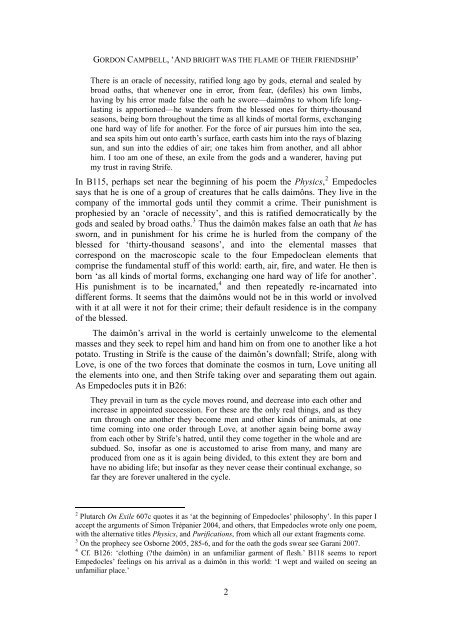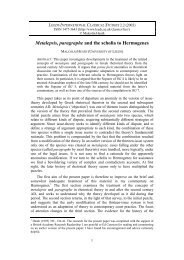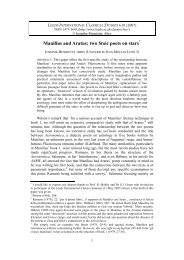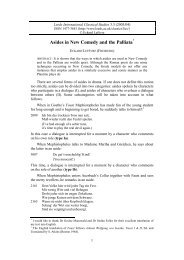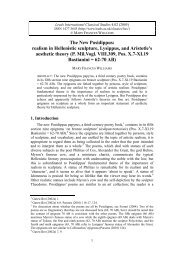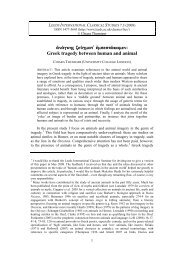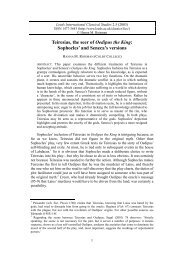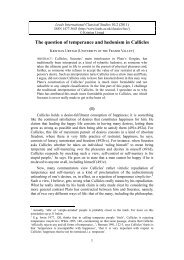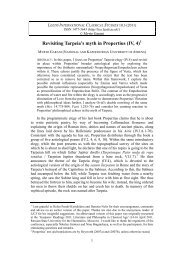'And bright was the flame of their friendship' - Leeds International ...
'And bright was the flame of their friendship' - Leeds International ...
'And bright was the flame of their friendship' - Leeds International ...
Create successful ePaper yourself
Turn your PDF publications into a flip-book with our unique Google optimized e-Paper software.
GORDON CAMPBELL, ‘AND BRIGHT WAS THE FLAME OF THEIR FRIENDSHIP’<br />
There is an oracle <strong>of</strong> necessity, ratified long ago by gods, eternal and sealed by<br />
broad oaths, that whenever one in error, from fear, (defiles) his own limbs,<br />
having by his error made false <strong>the</strong> oath he swore—daimôns to whom life longlasting<br />
is apportioned—he wanders from <strong>the</strong> blessed ones for thirty-thousand<br />
seasons, being born throughout <strong>the</strong> time as all kinds <strong>of</strong> mortal forms, exchanging<br />
one hard way <strong>of</strong> life for ano<strong>the</strong>r. For <strong>the</strong> force <strong>of</strong> air pursues him into <strong>the</strong> sea,<br />
and sea spits him out onto earth’s surface, earth casts him into <strong>the</strong> rays <strong>of</strong> blazing<br />
sun, and sun into <strong>the</strong> eddies <strong>of</strong> air; one takes him from ano<strong>the</strong>r, and all abhor<br />
him. I too am one <strong>of</strong> <strong>the</strong>se, an exile from <strong>the</strong> gods and a wanderer, having put<br />
my trust in raving Strife.<br />
In B115, perhaps set near <strong>the</strong> beginning <strong>of</strong> his poem <strong>the</strong> Physics, 2 Empedocles<br />
says that he is one <strong>of</strong> a group <strong>of</strong> creatures that he calls daimôns. They live in <strong>the</strong><br />
company <strong>of</strong> <strong>the</strong> immortal gods until <strong>the</strong>y commit a crime. Their punishment is<br />
prophesied by an ‘oracle <strong>of</strong> necessity’, and this is ratified democratically by <strong>the</strong><br />
gods and sealed by broad oaths. 3 Thus <strong>the</strong> daimôn makes false an oath that he has<br />
sworn, and in punishment for his crime he is hurled from <strong>the</strong> company <strong>of</strong> <strong>the</strong><br />
blessed for ‘thirty-thousand seasons’, and into <strong>the</strong> elemental masses that<br />
correspond on <strong>the</strong> macroscopic scale to <strong>the</strong> four Empedoclean elements that<br />
comprise <strong>the</strong> fundamental stuff <strong>of</strong> this world: earth, air, fire, and water. He <strong>the</strong>n is<br />
born ‘as all kinds <strong>of</strong> mortal forms, exchanging one hard way <strong>of</strong> life for ano<strong>the</strong>r’.<br />
His punishment is to be incarnated, 4 and <strong>the</strong>n repeatedly re-incarnated into<br />
different forms. It seems that <strong>the</strong> daimôns would not be in this world or involved<br />
with it at all were it not for <strong>the</strong>ir crime; <strong>the</strong>ir default residence is in <strong>the</strong> company<br />
<strong>of</strong> <strong>the</strong> blessed.<br />
The daimôn’s arrival in <strong>the</strong> world is certainly unwelcome to <strong>the</strong> elemental<br />
masses and <strong>the</strong>y seek to repel him and hand him on from one to ano<strong>the</strong>r like a hot<br />
potato. Trusting in Strife is <strong>the</strong> cause <strong>of</strong> <strong>the</strong> daimôn’s downfall; Strife, along with<br />
Love, is one <strong>of</strong> <strong>the</strong> two forces that dominate <strong>the</strong> cosmos in turn, Love uniting all<br />
<strong>the</strong> elements into one, and <strong>the</strong>n Strife taking over and separating <strong>the</strong>m out again.<br />
As Empedocles puts it in B26:<br />
They prevail in turn as <strong>the</strong> cycle moves round, and decrease into each o<strong>the</strong>r and<br />
increase in appointed succession. For <strong>the</strong>se are <strong>the</strong> only real things, and as <strong>the</strong>y<br />
run through one ano<strong>the</strong>r <strong>the</strong>y become men and o<strong>the</strong>r kinds <strong>of</strong> animals, at one<br />
time coming into one order through Love, at ano<strong>the</strong>r again being borne away<br />
from each o<strong>the</strong>r by Strife’s hatred, until <strong>the</strong>y come toge<strong>the</strong>r in <strong>the</strong> whole and are<br />
subdued. So, ins<strong>of</strong>ar as one is accustomed to arise from many, and many are<br />
produced from one as it is again being divided, to this extent <strong>the</strong>y are born and<br />
have no abiding life; but ins<strong>of</strong>ar as <strong>the</strong>y never cease <strong>the</strong>ir continual exchange, so<br />
far <strong>the</strong>y are forever unaltered in <strong>the</strong> cycle.<br />
2 Plutarch On Exile 607c quotes it as ‘at <strong>the</strong> beginning <strong>of</strong> Empedocles’ philosophy’. In this paper I<br />
accept <strong>the</strong> arguments <strong>of</strong> Simon Trépanier 2004, and o<strong>the</strong>rs, that Empedocles wrote only one poem,<br />
with <strong>the</strong> alternative titles Physics, and Purifications, from which all our extant fragments come.<br />
3 On <strong>the</strong> prophecy see Osborne 2005, 285-6, and for <strong>the</strong> oath <strong>the</strong> gods swear see Garani 2007.<br />
4 Cf. B126: ‘clothing (?<strong>the</strong> daimôn) in an unfamiliar garment <strong>of</strong> flesh.’ B118 seems to report<br />
Empedocles’ feelings on his arrival as a daimôn in this world: ‘I wept and wailed on seeing an<br />
unfamiliar place.’<br />
2


